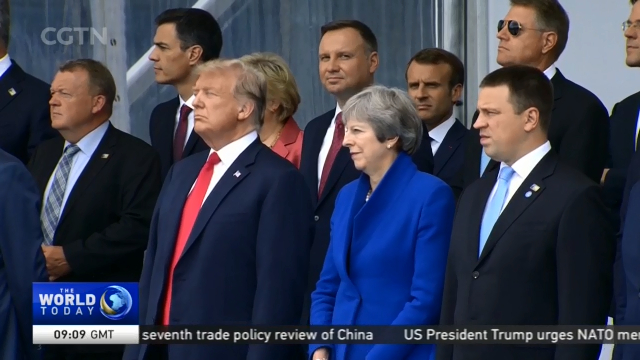
18:14, 12-Jul-2018
NATO Summit: US President pushes members to increase spending
Updated
17:38, 15-Jul-2018
03:17

Fanfare, pomp and ceremony. NATO allies put their military might on display in the skies above their new glass palace to kick off the 2018 summit.
JENS STOLTENBERG NATO SECRETARY GENERAL "Welcome to the Brussels summit. 29 nations bound together by common history and common challenges. Committed to standing together and protecting each other. We owe our success to our unity."
That political unity, at the very core of NATO's being, was also something others wanted to impress upon.
CHARLES MICHEL BELGIAN PRIME MINISTER "I have faith in multilateralism. We face substantial geopolitical transformations and new forms of threats. And we can overcome these hardships because our values are intangible benchmarks for our solidarity."
But could the alliance overcome the new "challenge" posed by US President Donald Trump who has been piling pressure on allies to spend and commit more?
Over breakfast with NATO's Secretary General, Trump pulled no punches. Calling allies "delinquent".
DONALD TRUMP US PRESIDENT "Germany is totally controlled by Russia, because they will get 60 to 70 percent of their energy from Russia and a new pipeline. You tell me if that's appropriate. I think it's not. On top of that Germany is paying a little bit over 1% whereas the US is paying (in real numbers) close to 4.2% of a much larger GDP."
Although later on Trump changed his tone in a one-on-one meeting with Germany's Chancellor Angela Merkel, calling their relationship "tremendous".
But Trump's long-time message may have had an impact. European Allies and Canada have agreed to commit an extra 266 billion US dollars on defense through 2024. A new non-combat training mission in Iraq is to be led by Canada and allies also signed off on a new command structure along with boosting defenses against Russia.
JENS STOLTENBERG NATO SECRETARY GENERAL "In the history of NATO we also had many disagreements but we always overcome them again and again because at the end of the day, we all agree that North America and Europe are safer together."

SITEMAP
Copyright © 2018 CGTN. Beijing ICP prepared NO.16065310-3
Copyright © 2018 CGTN. Beijing ICP prepared NO.16065310-3